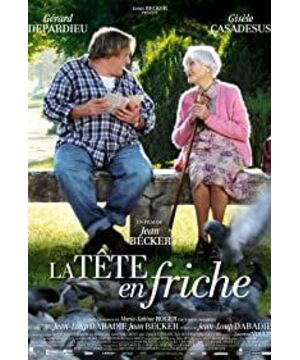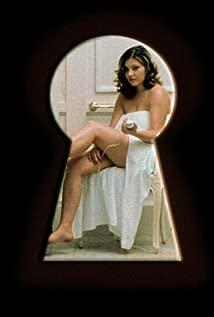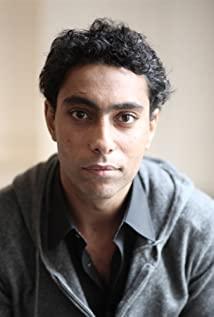This is certainly a story about love.
But in all love stories, it's not just love.
The fat and clumsy Chazes did not have a good childhood, but had a childlike innocence. At the age of fifty, he took a few odd jobs, took care of his half-mad mother, went to the park bench and counted the pigeons and named them one by one. On a sunny afternoon, he met a 95-year-old elegant and intellectual lady who read Camus' "The Plague" aloud to him, so that it opened up in his desolate brain (the French name of the film La tête en friche). A gorgeous little flower blooms. This old lady, introduced in the words of the movie: dans sa tête, il ya des milliers d'étagères, et dans ces étagères, il ya des livres, des livres...
The film "Afternoon with Margaret" flows like a beautiful prose. The people watching are warm. There has been a lot of discussion about the original sin of the family of origin recently, and this story does not rush us to believe in the kindness in life and the love between people. I often wonder, how many people's childhood is as perfect as a fairy tale? Whose childhood is full of love? Most parents are also first-time parents, so there is always something to be desired. It would be unfair to attribute all unhappiness after growing up to an imperfect childhood and to the family of origin. Germain in the movie has dyslexia since he was a child, his father is missing, his mother is irritable, and his classmates and teachers bully him.
I may be an idealist, always thinking that "true heroism is to still love life after seeing the truth of life." Life is to live a lively life, remind yourself to be restrained in good times, and allow yourself in bad times Depressed for a while, then I still have to get up and move on.
"No matter which step a person takes, he always has to find some fun, think of a way, always frowning, why!"
In the movie, Germain asks the old lady, what if she wasn't loved as a child? What will happen? She replied, "If childhood doesn't get enough love, he still has a lot to discover."
"
— S'il n'avait pas été aimé par sa mère, ce se serait passé quoi?
— Si quelqu'un n'a pas reçu assez d'amour dans son enfance, il lui reste encore tout à découvrir.
"
When I was younger, I knew too little about the world, and I wasn't a sensitive and delicate person, so I just slapped on and off. Now that I think about it, this cheesy way is also very happy. Now that I am a little older, my knowledge has increased, I have seen some things in the world are impermanent, I have more thoughts and more worries, and I always remind myself that it is most important to be down-to-earth. The people I have met in my life who have lived a good life all have the characteristics of quietness and industriousness, giving people a sense of perseverance and security. Life in their hands will become obedient, peaceful and stable.
In addition to discussing the love between strangers, the film also discusses the love between parents and children. During the epidemic, I have been with my parents for a long time, and I have been thinking about a question a few days ago - how to love my parents better. There is always a kind of distance between you and your parents that everything is good, but when you get close, you are not used to all kinds of troubles. I saw this sentence in Maupassant's "Life" before,
"comme si lorsque l'on a beaucoup pensé de loin aux gens qu'on aime, et a perdu l'habitude de les voir à toute heure. On éprouvait en les retrouvant, une sorte d'arrêt d'affection jusqu'à ce que les liens de la vie commune fussent renoués”. (“Sometimes, we are so used to thinking about loved ones from a distance that we lose the ability to get along with them day and night. When we live together again, there will inevitably be frictions and doubts, until Years in the same place bind us together again.)
Germain's mother looks disgusting, irresponsible, and crazy, but she doesn't allow outsiders to beat her children, and she is also a fierce hen to protect her children. And Germain is the same, no matter how much he hates his mother, he can't tolerate outsiders saying that she is not. This may be the case, as in a quote from Romain Gary's book in the film,
"
“On revient toujours gueuler sur la tombe de sa mère comme un chien abandonné.”
We will eventually return to our mother's grave, wailing like abandoned dogs.
"
In addition, there are two details in the movie that touched me very much, and I felt sad when I heard them. These two simple sentences made me think about two philosophical issues. One is the trembling 95-year-old Margueritte when talking about his own aging,
Le privilège de l'âge, c'est quand on s'ennuie, bah, au moins, ce n'est plus pour très longtemps.
The good thing about getting older is that even troubles don't last long.
Another sentence is when Gremain returned the dictionary, he said that the dictionary is useless for an idiot like himself:
C'est comme donner des lunettes à un myope. Tout d'un coup, on y voit trop, quoi. On voit tous les défauts, les trous, on se voit. Avec vous, j'ai essayé d'apprendre, mais ça me fait du mal, c'était mieux avant, dans le flou, dans le simple.
Giving us a dictionary is like giving a nearsighted eye a pair of eyes. Suddenly he saw everything too clearly. All the flaws, loopholes, including myself have seen clearly. With you, I'm trying to learn, but it's making me miserable. In contrast, I prefer the past, living in ambiguity and living a simple life.
View more about My Afternoons with Margueritte reviews










